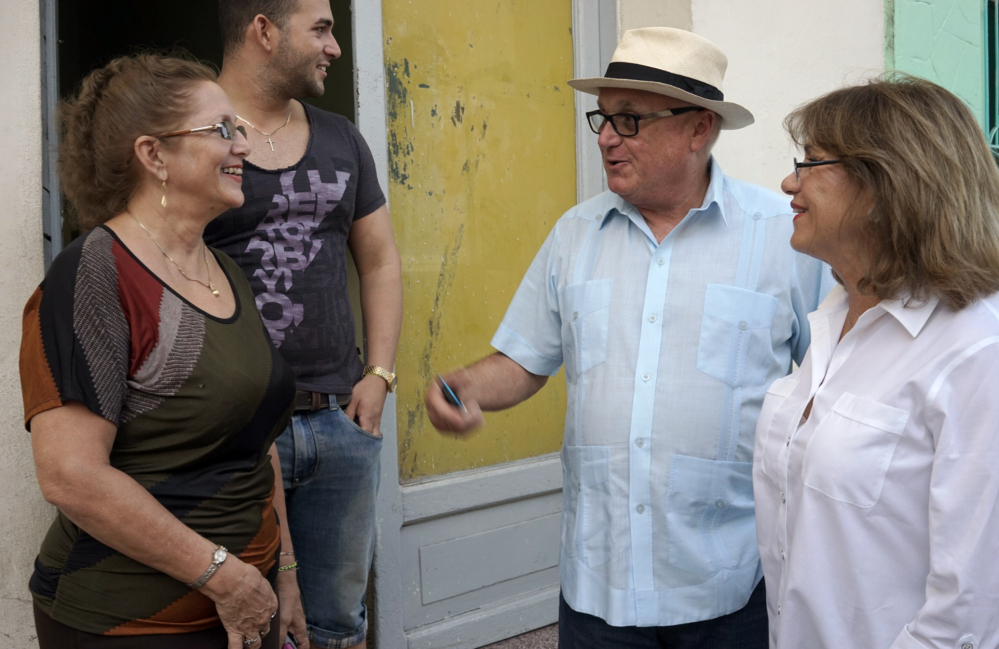HOLGUIN, Cuba — In this quiet city in eastern Cuba, families know how ideology can divide.
After Fidel Castro’s 1959 revolution, Olga Maria Saladrigas’ family decided they disagreed with the country’s new socialist system and fled to Miami. The father of her cousin Berta Luisa Fernandez backed the revolution and decided his family would stay. The two women grew up with only a handful of memories of each other.
As Pope Francis called on Cubans to overcome their differences at a Mass in Holguin on Monday, the cousins reunited for the third time in 50 years, a living example of the reconciliation that the pope has made a central theme of his trip to Cuba.
Saladrigas and her husband, Carlos, a Cuban-American businessman who has been one of the key backers of U.S.-Cuba detente, flew to Havana for the pope’s visit, then drove 14 hours to Holguin, arriving at 6:30 a.m.
Fernandez and Olga Maria Saladrigas screamed when they saw one another, kissing and hugging before breakfast.
“We love each other very much,” Fernandez said as they embraced.
Fernandez watched nearly all her relatives leave in the years after the revolution. She learned of her cousin growing up, getting married and having four children through letters, stories and photographs. Fernandez has kept all of them.
Fernandez’s house is filled with items sent by relatives living abroad: a flat-screen TV from her brother in the Dominican Republic, a floral chaise from Saladrigas. Fernandez would like to visit the U.S., but said she has no plans to leave permanently. She takes care of her 86-year-old mother, who is now blind.
As Olga Maria and Carlos drove to the pope’s Mass in Holguin, she cried as she looked out at the city of about 300,000 people.
“That’s where I used to ride my bike,” she said, pointing to a plaza near her cousin’s home.
In his homily, Francis pressed some of the themes he has developed during this visit, telling of how Jesus picked a despised tax collector, Matthew, as a follower without casting judgment. That experience of mercy changed Matthew forever.
Francis told Cubans that they, too, should allow themselves “to slowly overcome our preconceptions and our reluctance to think that others, much less ourselves, can change.”
“Do you believe it is possible that a tax collector can be a servant?” he asked. “Do you believe it is possible that a traitor can become a friend?”
Carlos Saladrigas, chairman of the business-backed Cuba Study Group, said he believed Pope Francis’s visit to the United States and Cuba would further advance relations between the former Cold War-era foes.
“U.S.-Cuba relations are speeding up, clearly, and the pope with this trip, it’s going to get a new push,” Saladrigas said. “What is needed now is for Cuba to make some progress, too.”
He was among thousands of children sent alone by their parents to the U.S. in the early 1960s in a church-organized operation known as Pedro Pan. He became an outspoken critic of the Castro government and tried to stop a Cuban-American pilgrimage to the island when Pope John Paul II visited Cuba in 1998.
After seeing the Cuban people’s reaction to the pope, he had a change of heart and has now traveled to Cuba several times.
Olga Maria Saladrigas wants to see her cousin and old friends and walk the streets of her hometown again.
Saladrigas said the pope’s message hit home as she made the long trek from Havana to Holguin.
“I think he’s reminding us once more than families are the most important thing,” she said. “The most important thing is human beings and the relationship between one another. And we should all try together to fix our problems and be able to form a better Cuba for everybody.”
Copy the Story LinkSend questions/comments to the editors.



Success. Please wait for the page to reload. If the page does not reload within 5 seconds, please refresh the page.
Enter your email and password to access comments.
Hi, to comment on stories you must . This profile is in addition to your subscription and website login.
Already have a commenting profile? .
Invalid username/password.
Please check your email to confirm and complete your registration.
Only subscribers are eligible to post comments. Please subscribe or login first for digital access. Here’s why.
Use the form below to reset your password. When you've submitted your account email, we will send an email with a reset code.